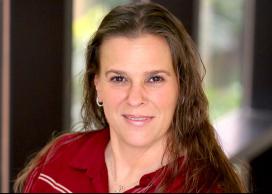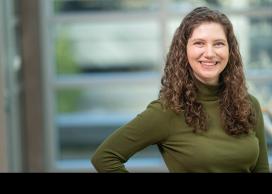Teaching in focus: Erika Fundelius
Learn more about the work of our educators at UBC

July 14, 2025
Name:
Erika Fundelius
My pronouns:
she/her
Title:
Assistant Professor
Faculty/Department/Unit:
Faculty of Education / Educational and Counselling Psychology, and Special Education / Blindness and Visual impairments
Location:
Vancouver
Year I started working at UBC:
2023
What first motivated you to become an educator?
I initially didn’t plan to become an educator, but I began working with children and retrained when I immigrated from Europe to the USA. My decades of experience as a paraprofessional and teacher showed me the impact of meaningful individualized support and inclusion. Pursuing advanced studies strengthened my commitment to fostering autonomy, accessibility, and quality education for all learners.
Tell us more about your work.
I identify as an educator both based on extensive training, experience, and passions. In the blindness and visual impairments program, we prepare educators who wish to specialize as teachers of students with visual impairments (K-12) or as orientation and mobility specialists working with individuals from birth to 99. Our comprehensive training sequences equip educators with the skills needed to support students across academic, expanded core curriculum, and rehabilitative contexts.
What inspired your particular approach to teaching?
As a preschool teacher, I learned that play is a child’s work—their primary way of learning and making sense of the world through all their senses. That understanding continues to shape my teaching today. I introduce activities such as cooking under blindfold, braille literacy, assistive technology, cleaning without sight, and navigating with a white cane to help students experience and understand the world from the perspective of someone who is blind or has low vision. I take a constructivist approach, acting as a co-facilitator of learning. I incorporate Universal Design for Learning (UDL) to support access for all students and model culturally responsive teaching. Ongoing self-reflection and examination of my own biases are essential to creating a respectful and inclusive learning environment.
What have you learned while teaching that has surprised you the most?
One of the most surprising things I’ve observed is how challenging it can be for experienced teachers to shift their practices when retraining in a new specialty. Many bring deeply rooted habits that have served them well in other contexts, and it takes time and support to adapt to new methodologies, even when they recognize the value of change. I’ve also come to appreciate just how much support adult learners need, regardless of age or prior experience. Returning to university can be overwhelming, and providing reassurance, clear expectations, reminders, and structured guidance is often essential to helping them succeed.
What impact do you hope to have on your students?
Moving from the classroom to an itinerant teacher position is challenging to most. I hope they learn to embrace ambiguity, hone in on their creativity and flexibility they never knew they had, and learn ways to find resources that best support their students and families. I want them to lead with thoughtful observations, advocating for students to both administrations and their broader communities with attention to post-secondary quality-of-life outcomes for their students.
Are there any colleagues or mentors you’d like to acknowledge and why?
In high school, a teacher once responded to my frustration with a simple “You can do it,” showing me the power of belief. Dr. Linda Platas, who hired me as a graduate assistant, consistently validated my work product and continues to be a mentor. Dr. Sandra Lewis, took a chance on me as an nontraditional (older) student and accepted me into my doctoral program, playing a crucial role in my path to UBC.
Learn more:
- Our people
- Teaching and Learning
- Teaching in focus






